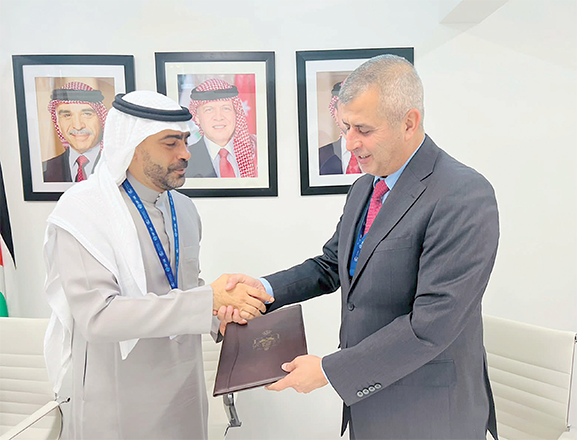AMMAN — Memoranda of Understanding (MoUs) signed during COP28 in the field of green hydrogen and green ammonia are set to usher a new era of climate finance and reduced reliance on fossil fuels in Jordan, according to economists.
Linda Abadi, spokesperson for the Ministry of Energy and Mineral Resources, informed The Jordan Times that the ministry has entered five new MoUs in the field of green hydrogen and green ammonia production with various companies.
Additionally, there is one agreement for the joint development of a wind energy project with the Abu Dhabi Future Energy Company (Masdar).
Minister of Energy and Mineral Resources Saleh Kharabsheh listed the partners and goals of each MoU.
The wind energy agreement with Masdar aims to develop a 1 gigawatt wind power station with a Battery Energy Storage System in Jordan, as per a ministry statement.
The first MoU in the field of green hydrogen, signed with Masdar during the climate conference aims to conduct a feasibility study for establishing a green hydrogen project. The plan includes constructing a factory near the Aqaba Port to annually produce up to 50,000 tonnes of competitively priced green hydrogen using de-salinated seawater and renewable energy.
The second MoU for green hydrogen was signed with Aqua Power Saudi Arabia, allowing the company to conduct initial feasibility studies for a project aiming to annually produce 100–150 thousand tonnes of green ammonia.
The third MoU was signed with the Korean Electric Power Corporation (KEPCO) and Xenel International, enabling the coalition to conduct initial feasibility studies for a project to produce green hydrogen and 1 million tonnes of green ammonia annually in Jordan.
The fourth MoU was signed with Ocior Energy, an Indian/Emirati company. This allows the company to conduct initial feasibility studies for a project aiming to produce 1 million tonnes of green ammonia annually. The development will occur in stages, with the first phase producing 100,000 tonnes annually, gradually increasing to 1 million tonnes by 2030.
The fifth MoU in the field of green hydrogen was signed with Catalyst Investment Management Jordan to produce green hydrogen in Jordan. The company will be able to conduct initial feasibility studies for its project, aiming to produce 150,000 tonnes of green ammonia annually.
The Jordanian government’s efforts are part of a serious and continuous initiative to enhance Jordan’s role as a regional hub for green energy production, Kharabsheh said.
This includes providing high-quality and cost-competitive green hydrogen fuel by leveraging abundant renewable energy sources and the country’s strategic geographical location in the region that ensures access to European markets.
Kharabsheh praised the regional and national cooperation undertaken to come to these agreements as well as the signing companies for their partnership.
He also reinforced the ministry’s priorities and highlighted how they fit within the framework of the Jordanian government’s recently launched Economic Modernisation Vision (2023-2033). This includes investments in green hydrogen production projects, part of Jordan’s initiatives to transition to clean energy use aiming to achieve net-zero emissions.
Economist Hussam Ayesh told The Jordan Times that these projects will bring significant economic opportunities for Jordan.
“Investing in renewable energy to produce green ammonia and hydrogen will allow the export of energy from Jordan to other countries,” Ayesh said.
Ayesh described the return that renewable energy production has.
“One kilo of hydrogen equals the same amount of energy generated from 1 kilo of gas. Therefore, the energy return from hydrogen is very high, making the investment in hydrogen extremely feasible,” Ayesh said.
Such opportunities will diversify energy sources in the Kingdom and will positively impact energy costs for investors, manufacturing sectors, and individuals, Ayesh said
Economist Khaled Salameh told The Jordan Times that these agreements will increase competitiveness in Jordan and will bring foreign currency.
“These projects compromise an opportunity for the government to generate revenues,” Salameh said.
Salameh also discussed the impact these projects will have on unemployment and future generations.
“Such projects help reduce university graduates’ unemployment. Such projects require advanced skills and knowledge, which will definitely help reshape future generations,” Salameh said.
“Jordan can benefit from these projects in all different sectors, from manufacturing, production and even transportation,” he explained.
These projects will reduce Jordan’s reliance on fossil fuels, decrease carbon emissions and usher Jordan into a new phase with better coping mechanisms to mitigate the impact of climate change, Salameh added.
